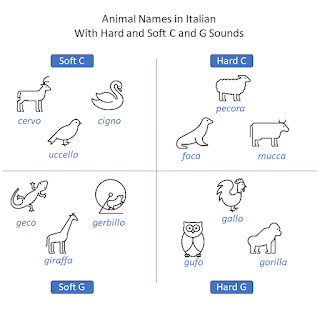Animal names showing hard and soft C and G sounds
I’ve always had this nagging doubt about whether to pronounce the I in some words, in particular those where the letter I follows C and G. In short, you don’t pronounce the I if it follows C or G.
It's all albout understanding why the I is used and that is to soften the C or G sound.
Soft C and G
- cesto, gesto, circolo, ceci
- gelato, giro, giglio
- NOTE 1: Add I to soften, but the I is not pronounced.
- cialtrone, ciocca, ciurma, ceci, ciao, ciò, ciuco
- giostra, gioco, giacca, giù, giuramento
- cane, cosa, culla, crisi, cacao, cucù, cocco
- gatto, goccia, guerra, gusto, gas
- choc, frac (hard at the end of words with exceptions)
- NOTE 2: Add H to harden the sound when C and G followed by E or I.
- chi, che, parcheggio
- ghianda, ghetto, ghiro
C and G followed by E are already softened by the letter E so the letter I is not needed. Of course, there are exceptions, see NOTE 3.
NOTE 2: To harden a C and G followed by the letter E or I, add the letter H.
NOTE 3: Exceptions where the letter I appears after C or G but still is not pronounced:
- Words with a Latin origin: efficienza, effigie, igiene, superficie, specie and derived words.
- Subjects that end in IERA or IERE: crociera, paciere, raggiera, pasticciera.
- The words: cielo and cieco.
- Plural of nouns ending in CIA: cieliega/ciliegie, camicia/camicie, valigia/valigie.
- Plural of nouns ending in CÌA or GÌA (last syllable stressed): farmacia/farmacie, bugia/bugie.

No comments:
Post a Comment
All comments are moderated. If your comment doesn't appear right away, it was likely accepted. Check back in a day if you asked a question.